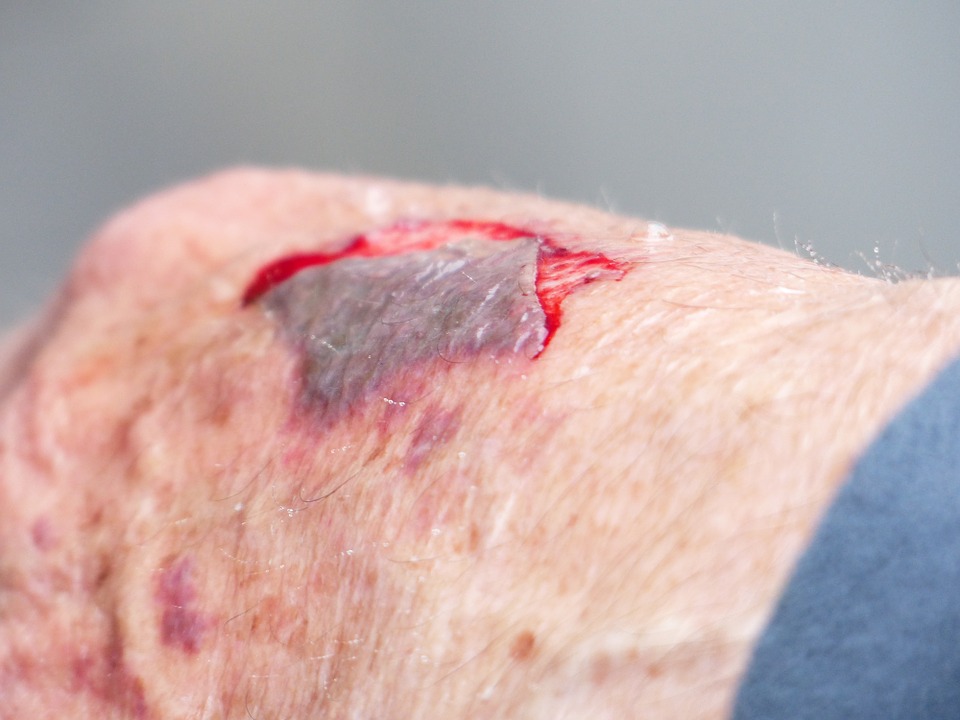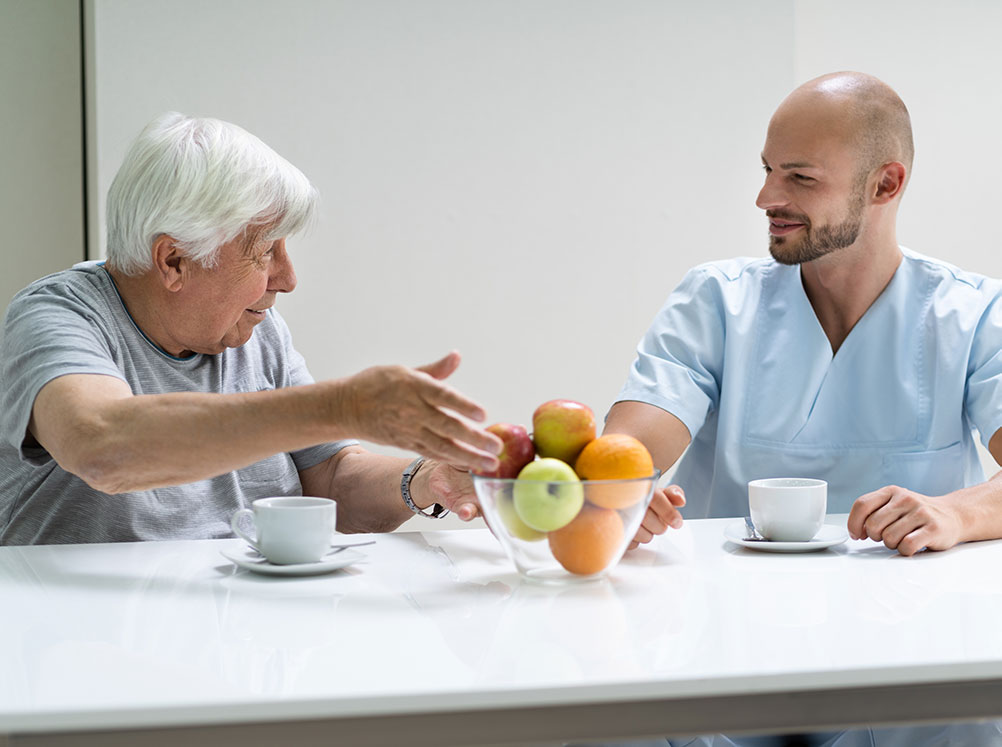Operational readiness, common sense or practical understanding
This article is written from a Swedish perspective. Hopefully, it can inspire interested parties from other countries.
Operational readiness, common sense, or practical understanding. In scientific terms, it is called phronesis. When we start working in elderly care, we are faced with new situations where we are to meet strangers. Helping another person with intimate hygiene is not always easy, but many have a sense for or natural ability to approach others in sensitive care situations.
 Foto: Mostphotos
Foto: MostphotosCommon sense is a worn-out concept, but what does it mean in healthcare? There is a practical wisdom in dealing with people that cannot be learned from books. It means seeing and understanding how we can help or that something is wrong when a person cannot express their needs in words. Already Aristotle noted practical wisdom, which he named "phronesis".
Phronesis
Phronesis is the ability to meet another person with their specific needs in a certain situation. Some call it judgment, others call it practical understanding or common sense. One factor seems to be the ability to empathize with another person, to feel compassion.
The feeling that should exist between healthcare professionals and residents cannot be achieved by being "formally educated". Genuine helpfulness is humility in wanting to help. Many employees have knowledge of non-verbal and intuitive competence. Many difficult situations arise in healthcare.
One factor in building a foundation for judgment is continuity. Getting the opportunity to get to know and gain a natural frame of reference around the people we care for in order to "cajole" and get a "fingertip feeling" to act "right" in situations that arise in the care of the elderly. I judge continuity to be one of the most fundamental aspects in order to provide good care and service. Especially when dealing with people who have difficulty communicating.
It is difficult to measure good judgment or practical wisdom in handling a situation in a certain way. Yet these are qualities we value in colleagues or healthcare professionals we encounter. My perception is that we develop it with experience. We acquire a certain readiness to act. In the interaction with the resident, theory and practice are adapted to the resident's wishes and needs.
In healthcare, there is sometimes talk of a clinical gaze. It is a concept when it comes to describing quality that is difficult to measure. The ability to see subtle nuances of change in a health condition. Signals that can be the difference between life and death for the elderly. The ability to see and understand that something is not right is essential in the care of our elderly.
The concept of social competence is used, but it only partially describes the quality that is fundamental when we work in healthcare. Aristotle used the term "Phronesis". It is a bit complicated, but it is difficult to capture a feeling that should exist in the encounter between healthcare personnel and residents.
Inspiration in this case is drawn from the radio program "The Philosophical Room" which was about quality. Jonna Bornemark, PhD in philosophy at Södertörn University, highlighted this aspect of caregiving.
Conversation creates quality in healthcare
Conversations provide understanding of needs and desires as a lot happens throughout the day. Joy and sorrow, memories and desires, habits and eccentricities. Motivational and existential conversations are included and involving the resident and their relatives in conversation creates quality.
Conversations are part of nursing work. There are many different types of conversations. In the role of nursing assistant, it can be about investigative conversations to get to know a new resident and their relatives. It is good to think about how you ask questions. Older people may have longer response times, so leave a pause when the question is asked. Allow the older person time and opportunity to answer themselves and provide support so that the relative, or you, do not answer in the resident's place.
It can be about guiding conversations. Information about what activities are offered and trying to get the resident to participate in these. In care situations, on the other hand, it can be about providing indirect support. Instructing the resident on how to dress to maintain the ability to take care of themselves is one example.
There is something in the proverb that we have two ears so we should listen twice as much as we speak. Listening is more than just hearing. It's also about understanding. To support the person speaking and to keep the conversation flowing, you can confirm the speaker by nodding, smiling, and humming. Brief supplementary questions can increase your own understanding.
Questions can be open or closed. Some questions can only be answered with yes, no, good, bad, or the like. Other questions can be more open and invite the person to tell about something.
One way to show that you have listened and understood is to mirror and summarize what you have heard. This gives the resident and their relatives the opportunity to correct any misunderstandings and a confirmation that you have really listened during the conversation. One way to show that you are listening is to respond clearly when asked questions. If you don't know the answer, say so but also offer to find out what applies.
There are different techniques for working with conversations in healthcare. The method "Motivational Interviewing" is one of them, which can be used in conversations about lifestyle changes. It can be used in other contexts. There is a lot of literature that provides depth in the art of conversation.
Managing constant changes
Resilience is a term often used to describe the ability of a system to handle changes and continue to develop. Different organizations have different abilities to handle disturbances and deviant events. One difficulty is to perform tasks well while simultaneously developing the operation.
In a nursing home, constant changes take place that require the operation to adapt. Someone gets a fever, a newly moved person has special needs for care, a resident returns from the hospital and needs physical therapy or tube feeding. New treatment methods and medical-technical products and changed requirements. For the employees, this means constant learning and adapting the work to the situation, which mostly goes well.
In the operation, there must be barriers to limit the risk of someone making a mistake. It's about, for example, competence and routines. It is important that employees see risks and understand how to adapt the work to avoid mistakes. The ability to improvise in a safe way often increases with age and experience.
Care staff should be met with responsiveness and respect when they contact licensed personnel to ensure that the care is safe. Basic training is carried out so that nursing assistants are not expected to, for example, measure blood oxygenation (saturation) if they have not done it before.
The thoughts and views of the resident and relatives are important for providing safe and secure care. They may have seen how a new task was performed at the hospital and react when someone at the nursing home does it differently. Anxiety in the resident can be a signal that all is not right. Good communication with residents and relatives reduces the risks of care injuries. Often, the care handbook or colleagues can provide guidance on how the task should be carried out.
There may be special risks when a resident has just moved in. Anxiety and confusion in the resident are common while the staff have insufficient knowledge of the resident's social and medical needs.
By writing deviations on events that have led to or could have led to care injury, everyone contributes to increasing the ability to handle rapid changes safely. When the operation works systematically with deviations, everyone becomes aware of which situations and moments can be particularly risky in the operation.
Accidents and care injuries often occur in connection with stress. Good working environment, good basic planning, order and tidiness are factors that contribute to reducing the risks in the operation. Another risk factor can be medical-technical products that are rarely used in the operation or where newly hired employees end up in situations where they are set to perform tasks that they have not received sufficient training for.
At night when staffing is low, the risks increase. If you work alone and several serious things happen at the same time, it sometimes becomes difficult to make the right priorities. Cooperation between units and with the on-call nurse is fundamental to creating a safe and learning culture.
Reflection - readiness to act
Care staff:
• Do you have a colleague who has a special ability to see and meet the needs of the residents?
• What do you do if you have trouble having a good conversation?
• Have you received any training in conducting conversations in healthcare?
• Do you get good support to handle new situations?
• Does the unit have a good ability to handle unplanned events?
Manager, nurse, occupational therapist and physiotherapist:
• Are there nursing assistants whom you perceive as role models when it comes to practical judgment in work?
• How do you highlight this?
• Do you conduct risk analyses regularly to be prepared for the unexpected?
• How would the care function if the residence was without electricity or water for a day?
• Are the employees good at conducting conversations?
• Is there a need for training in conversation techniques?
Resident and relative:
• Do you feel that the staff show the practical wisdom described?
• Do the staff handle stress well?
• Do you feel that there is a good conversational climate?
• Are the staff good at listening and conducting conversations?
Erland Olsson
Specialist Nurse
Sofrosyne
Quality in Elderly Care

Aktuellt i media
- 2025-06-26 04:00 04 Bemötande
-
2025-06-23 04:00
02 Värdegrund
Navigating Power in Elderly Care: How to Navigate Through Power, Responsibility and Ethics to Contribute to a Fair and Dignified Everyday Life
info -
2025-06-16 04:00
08 Förebyggande o lokaler
"Pressure Ulcer Prevention in Nursing Homes - a Guide to Systematic Preventive Work"
info Bild: Pixabay
Bild: Pixabay - 2025-06-12 04:00 18 Arbetsmiljö och utveckling
- 2025-06-09 04:00 07 Riskhantering
- 2025-06-05 04:01 03 Ledarskap


